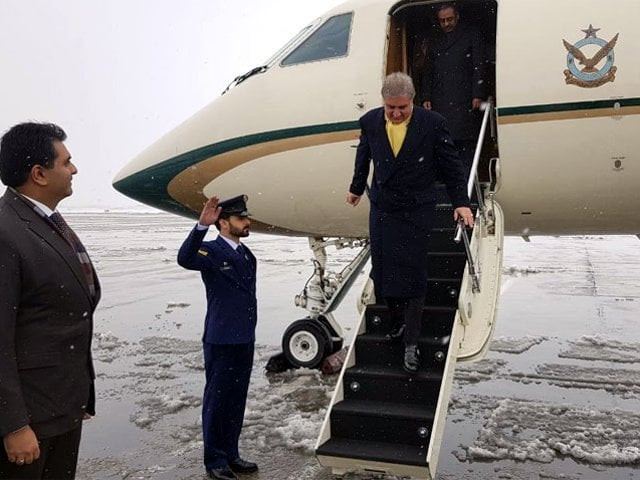Qureshi arrives in Tehran on first leg of Middle East peace mission
Foreign minister pays respects at shrine of Imam Reza in Mashhad before heading to Iran capital

Accompanied by Foreign Secretary Sohail Mehmood, the minister was warmly received by Director General of Iranian Foreign Ministry Syed Rasool Musavi and senior officials of the Pakistan Embassy.
Foreign Minister Qureshi commenced his visit from Mashhad where he paid respects at the holy shrine of Imam Reza (AS), descendant of Holy Prophet Hazrat Muhammad (PBUH) where he prayed for Muslim unity and regional stability.
FM Shah Mehmood Qureshi prays for Pakistan’s security and unity of Muslim ummah at shrine of Imam Reza in Mashhad pic.twitter.com/PuvdqvJMKK
— The Express Tribune (@etribune) January 12, 2020
In Mashhad, the foreign minister also met Governor General of Khorasan-Razavi province Ali Reza Razm Hosseini, who warmly welcomed him and his delegation.
The governor general told the foreign minister that they catered around three million pilgrims annually coming from across the world including Pakistan.
FM Shah Mehmood Qureshi meets Mashhad Governor General Khurasan-Razavi upon arrival in Iran pic.twitter.com/xmg8DbEpMx
— The Express Tribune (@etribune) January 12, 2020
In his remarks, the foreign minister said that starting his trip from the holy place was a matter of honour for him. The foreign minister also thanked the governor general for facilitation of the Pakistani pilgrims who visit the shrine in a huge number annually.
Arrived in Mashad, Iran commencing my trip to build better understanding & peace in the region. Honoured to pay my respects at the Holy Shrine of Imam Reza (A.S), descendant of Hazrat Muhammad (PBUH) as my first stop where I prayed for Muslim unity & regional stability. pic.twitter.com/LYs7KOEzAj
— Shah Mahmood Qureshi (@SMQureshiPTI) January 12, 2020
FM Qureshi is also scheduled to meet his Iranian counterpart Javad Zarif and exchange views on the evolving situation in the region.
He would then leave for Riyadh to hold talks with Saudi Foreign Minister Prince Faisal bin Farhan Al Saud and consult on the issues of regional peace and stability after concluding his two-day visit to Iran on Monday.
Qureshi’s visits are part of Pakistan’s efforts to help defuse tensions ignited by hostilities between Iran and the United States.
US forces killed Iran’s most revered military commander Maj Gen Qassem Suleimani in a drone strike near Baghdad airport on January 3, while in revenge Tehran attacked two US military bases in Iraq with missiles five days later. Though the two countries have apparently stood down, tension is still running high in the region.
US officials frequently contacted Pakistani military brass during the crisis, but Islamabad made it abundantly clear that it would not become party to any armed conflict in the region and instead advised all to exercise maximum restraint to avoid war.
During these visits, the foreign minister will share Pakistan’s perspective on the current situation, stress the imperative of avoiding any conflict, underscore the importance of defusion of tensions, and stress the need for finding a diplomatic way forward, according to Foreign Office spokesperson Aisha Faroqui.
The foreign minister will convey Pakistan’s readiness to support all efforts that facilitate resolution of differences and disputes through political and diplomatic means, she said during a weekly press briefing.
Following the Iranian missile strike on two US military bases in Iraq, US President Donald Trump, who had earlier warned Tehran of “disproportionate” action for any attack on Americans or US assets, decided not to retaliate. And in a subsequent letter to the UN secretary general, he offered “unconditional talks” to Tehran – the offer was spurned however.
The possibility of another war in the region appears to have diminished. This has raised the question if there is still need for Pakistan’s peace mission? “Yes,” said Farooqui on Thursday.
“There is always room for engagement and interaction within the region and beyond. The foreign minister’s visit will be aimed towards this,” she added.
(With input from APP)



















COMMENTS
Comments are moderated and generally will be posted if they are on-topic and not abusive.
For more information, please see our Comments FAQ